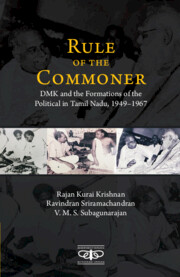1 - Construction of “Dravidian–Tamil” People
Published online by Cambridge University Press: 15 June 2022
Summary
… the political operation par excellence isalways going to be the construction of a“people.”
—Ernesto Laclau, OnPopulist ReasonThe political vigor and success of the Dravida MunnetraKazhagam (DMK), a particular political vehicle ofthe diffuse ideation of Dravidianism, rests on themetaphoric hyphen that both brings together andseparates the twin political identities of Dravidianand Tamil. The Dravidian aspiration was anchored inthe demand for an independent, sovereign, socialistsouth Indian federation of states that the partydeclared as its goal at the moment of its inceptionin 1949 and held until 1963, when it was officiallygiven up due to a constitutional amendment by theIndian government that proscribed “secessionism.”1Such a political aspiration was made possible byTamil language as the source of the culturaldistinction, which enabled the DMK to articulate thedemand for a Dravidian republic. Since the partyprimarily operated within the precincts of thelinguistic state of Tamil Nadu, its goal to form afederation of the four south Indian linguisticstates without such an aspiration being expressed bypolitical organizations in the other states made ita case of a part standing for the whole. Whilecritics have called it a weakness, detractors ajoke, and scholars have found it difficult to parse,we seek to posit it as the gift of history thatenabled the party to succeed so well in the basicact of the construction of a people through theformation of the political. We argue that theanchorage of Dravidian identity in the apparentlydistant demand for a south Indian republic insteadof a nation of Tamil-speaking people helped to layemphasis on the internal antagonism betweenBrahminical social order and the underprivilegedplebeian stock who sought empowerment. Since much ofour analysis of the various attributes of thepolitical mobilization of the party rests on thisbasic hypothesis, we would like to pay closeattention to this unique combination of the twoidentities, Dravidian and Tamil, with a hyphen ofsimultaneous conjunction and separation.
We also need to spell out how this pairing of Dravidianand Tamil was key to the processes we call“construction of a people” and the “formations ofthe political.” If constructing a people can betaken as demographic delimitation of the site of thepolitical, the formation of the political as theaccompanying act needs to set the stage for the playof agonism that Laclau calls internal frontier.
- Type
- Chapter
- Information
- Rule of the CommonerDMK and Formations of the Political in Tamil Nadu, 1949–1967, pp. 19 - 39Publisher: Cambridge University PressPrint publication year: 2022



